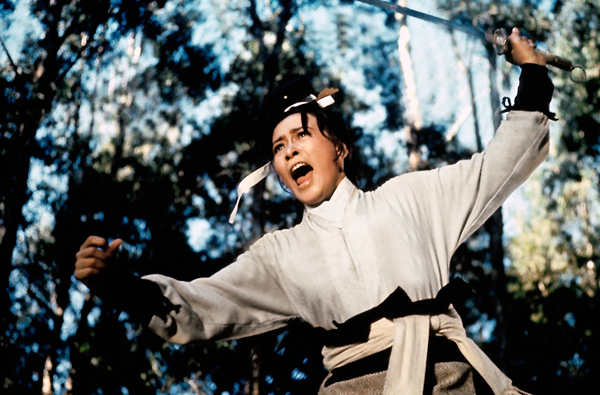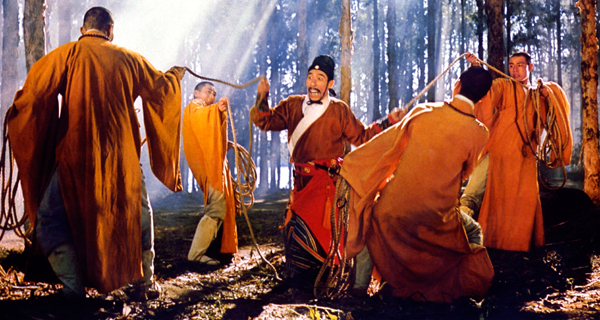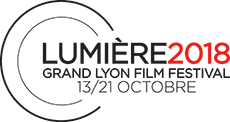Epic "Wu xia pian"
The profound splendor of A touch of Zen
POSTED ON OCTOBER 11, 2018
In 1975, cinephilia discovers King Hu (1932-1997), when A Touch of Zen becomes the first Chinese film to take home an award from the Cannes Film Festival (Technical Grand Prize). Furthermore, the nation, and notion, of ‘China’ have their bases covered: Born in mainland Beijing, King Hu lived in Hong Kong (albeit then under British rule), and shot the film in Taiwan. Critic Jean de Baroncelli raved in Le Monde of May 24th, 1975, "The extraordinary beauty of the landscapes, the aerial grace of the battles, choreographed like ballets, the illusory aura infused throughout the tumultuous and dramatic odyssey - attest to the mastery of a filmmaker who at times rivals a Kurosawa or a Mizoguchi, and whom we hope will venture past the over-restrictive stereotypes of the soy-sauce-western."

According to the film critic, “soy-sauce-western" is an alternative label for "karate film," and too bad if A Touch of Zen is neither. Ironically, the fervor for "Karate movies" is precisely what will relegate "wu xia pian" to the back burner of modern relevance. (The Hong Kong genre “wu xia pian” literally translates as "chivalrous martial-arts film,” and by extension, “saber film”). Released in two parts in 1970 and 1971, separated by several months, the film’s utter failure dealt a major blow to the perfectionist and highly-cultivated filmmaker, practically shunned by the other producers of the peninsula... Enter tireless trailblazer Pierre Rissient, who manages to convince King Hu to stitch the two parts together and present the three-hour version to the selection committee of the Cannes Film Festival.
A familiar combat adventure of a fumbling artist and a fugitive martial-arts expert, inspired by Chronicles of the Strange by Pu Songling, a Qing dynasty writer (French translation by Philippe Picquier editions), A Touch of Zen is the germinating seed that sprouted modern “wu xia pian" (you can now nonchalantly throw around the term). Many of Hu’s achievements appear in relatively recent works by Ang Lee or Zhang Yimou. A case in point, the sumptuous bamboo forest combat scene (trying our patience, it does not occur until the 50th minute) that will inspire the battle in House of Flying Daggers. Nature is a protagonist in King Hu's work (to the extent that critic Jacques Lourcelles compares it to Anthony Mann) and Buddhism is an essential element: the heroes’ path leads to the illumination of the truth.

Is A Touch of Zen an action flick or a metaphysical treatise? Both, and more, as Chinese historian Stephen Teo explains in King Hu's A Touch of Zen, "The film is historically important to the development of Hong Kong and Taiwanese cinema. Its deep significance and the reason it still resonates today lie in the subversive portrait of its heroine, and the ensuing sexual ambiguity that overtakes the male character and female character in equal measure. The film is a feminist manifesto structured as a Brechtian didactic play, where the actors and audience participate in a psychoanalytic narrative on sexuality and desire, punctuated by martial arts scenes and Peking Opera-style acrobatics, until they reach a state of spiritual transcendence. The plot brings together a pre-Oedipal heroine and a hero semi-paralyzed by Oedipal anxiety. During the story, the two characters unite for mutually beneficial reasons in a way that echoes aspects of modern life: single parenthood, bisexuality, gender fluidity. And more specifically, in the Chinese socio-cultural context, the question of individual will (being true to oneself) in the face of social obligations (the need to play a role) and "wenwu" (civil-military obligations) are all themes that weigh on the development of civil society in authoritarian China today.” A Touch of Zen? A full experience!
Adrien Dufourquet
For the King Hu tribute at the Lumière festival, click here!



